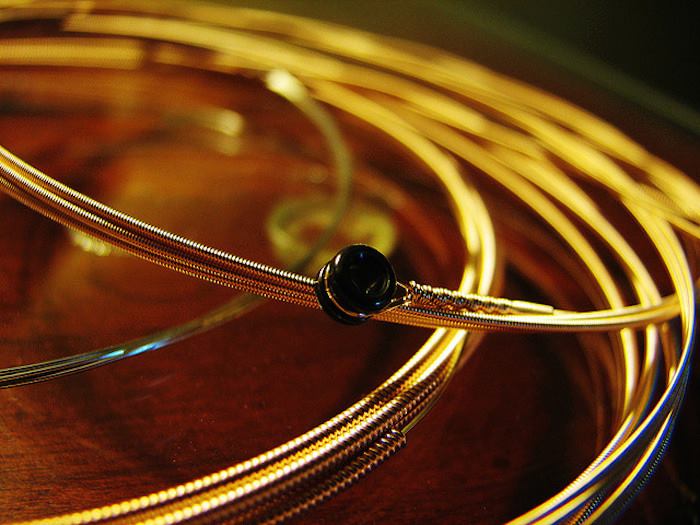 The very first part of this maintenance schedule involves keeping your strings as clean as possible. Since this particular subject happens to be very near and dear to me, I have discovered a few handy tricks and developed some basic rules throughout the years that will keep your strings squeaky clean at all times. Rule number one suggests that no one other than yourself should handle or play your instruments. It may seem odd, but there are several important reasons for this rule. Most importantly, it will completely sidestep the possibility of mixing any other player’s skin chemistry with your own skin’s acid/oil makeup.
The very first part of this maintenance schedule involves keeping your strings as clean as possible. Since this particular subject happens to be very near and dear to me, I have discovered a few handy tricks and developed some basic rules throughout the years that will keep your strings squeaky clean at all times. Rule number one suggests that no one other than yourself should handle or play your instruments. It may seem odd, but there are several important reasons for this rule. Most importantly, it will completely sidestep the possibility of mixing any other player’s skin chemistry with your own skin’s acid/oil makeup. This compound chemical reaction can prove quite fatal to a set of guitar strings and the real bummer is that it can – and will – happen when you least expect it. Say you keep a guitar out in the open on a stand or wall-hanger and one of your friends happens to pick it up and play it for only a moment or so. If you don’t remove their personal acids/oils from the strings immediately, their funky acidity can mesh with yours – all of the sudden, your strings are dead. Bear in mind that this can happen in an incredibly quick amount of time, depending on the other person’s chemical makeup; it’s no exaggeration when I say that I’ve seen this exact casualty happen in less than five minutes.
It should also be noted that what people eat and otherwise ingest can drastically shorten your strings’ lifespan – even certain over-the-counter medicines can cause total and complete mayhem. When you think about the possible costs of this chemical interaction, it can be amazingly high, especially if you’re the type that changes strings before every rehearsal or gig.
So what can we do to prevent our strings from suffering an early death? Luckily, the cure is amazingly cheap, coming in the form of a plastic bottle of lighter fluid (either Ronsonol or Zippo brand fluid will work just fine). This is simply the best couple of dollars you’ll ever spend for a literal ton of sonic prevention. The lighter fluid will safely and quickly remove all traces of acid and oil from the tops of your strings.
You’ll want to use common sense, but the lawyers insist that we've got to print the following: do not use lighter fluid around anything flammable.
One of the greatest characteristics of lighter fluid is that it evaporates within only a few seconds – it will not hurt fingerboards when used sparingly. Just put a half dollar sized spot of fluid on a clean cloth and run it up and down the entire playing length of the string, from the nut to the bridge. You may also want to slightly loosen the string so you can wrap that cloth around the whole string when cleaning. After cleaning each string ,simply retune and you’ll be good to go.
Over-stretching strings is another act of tonal terrorism if done in excess or incorrectly. A well-designed string should stretch out within seconds – not 15 minutes or more, as some people have reported to me as of late. Several gentle “pinch and release” lifts between the pickups using your thumb and index finger should suffice. Do not yank the strings in a Robin Hood “bow and arrow” motion either. This one mistake can kill strings faster than you might realize. Slow down and get it right – your guitars will thank you many times over.
If you are regularly breaking strings by the bridge saddles or stop-tailpiece, chances are you have a microscopic burr in the bridge saddle or elsewhere in that general area. I've seen the smallest burr slice through a .105 bass string like it was cheesecake. Bending strings is an art form that can take years to develop properly; if you slow down a steep bend, you’ll notice that you actually bend the string up just a hair before you finally take it all the way up to the desired pitch. This slight motion can prevent most string breakage. If you have strings breaking above the nut or in the middle of the fingerboard, that’s the tell-tale sign of a defective string; likewise, if you see a kink in any string of more than 30-45 degrees you can consider it history. Strings should unravel straight and have little bend in the length as it points downward. If any string seems to be in an arc (or semi-circle), then the string has been wrapped in the package too tightly. This can cause the string to wear out sooner than if it were loosely wrapped.